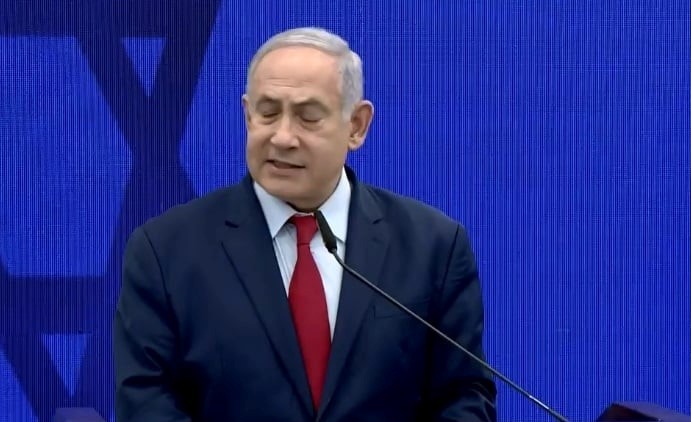Prime Minister Benjamin Netanyahu was indicted on Thursday, November 21, by Israel’s Attorney General Avichai Mandelblit for criminal offenses involving bribery, fraud and breach of trust.
This marked the first time in Israel’s history that a sitting prime minister has been indicted by the state’s judicial system, and the criminal offenses Mandelblit attributed to Netanyahu were enumerated in a harsh and severe charge sheet: bribery, fraud and breach of trust in Case 4000, the Bezeq-Walla Affair; fraud and breach of trust in Case 1000, the Illegal Gifts Affair; and fraud and breach of trust in Case 2000, the Yediot Ahronot-Israel Hayom Affair.
During Mandelblit’s dramatic speech at the Justice Ministry on Thursday the attorney general said: “This is a difficult and sad day. I am bringing an indictment of public corruption against the prime minister in three cases. It is sad for me personally and for the country.” Mandelblit admitted that he greatly admired Netanyahu’s talents, but that he was obligated by the law to press the charges against him. The attorney general noted that no man is above the law, and that enforcing the law should not be used as a political football by either the Left or the Right.
Ultimately, the decision to indict Netanyahu for bribery in Case 4000, the Bezeq-Walla Affairis, is the most decisive one. It means that his trial will be in a district court, known for being tougher than the lower magistrate’s courts, and that he could face a potential jail sentence of years instead of months or mere community service. Moreover, it means that any petition to the High Court of Justice to remove him from power has a much better chance of being accepted. In light of Netanyahu’s reaction to his indictment, such a petition would appear to be only a question of time, and a short one at that.
Netanyahu addressed Israel’s public on Thursday night, following the attorney general’s announcement, and said that he has no intention of resigning voluntarily from the premiership. He called the indictment “a coup attempt” driven by a corrupt set of prosecutors and demanded that an independent body review the prosecution. “It’s time to investigate the investigators,” he said.
Clearly, the indictment will significantly impact the ongoing efforts to form a coalition before the December 11 expiration of a period of 21 days allocated by the law, after both Netanyahu and Benny Gantz were unsuccessful in their respective attempts to form a ruling coalition. If that deadline is reached without the formation of a government by some currently untenable coalition, and barring a decision by the High Court to remove him from power, Netanyahu could theoretically remain in his position of caretaker prime minister until yet another election, the third in less than a year, to be held three months hence. Depending on the results of those next elections, it’s anyone’s guess if, how and when Netanyahu will be removed from power. He’s made it clear that he will not go without a fight and this threat and its concomitant uncertainty pose grave dangers to Israel’s democratic space and to the overall geopolitical situation of the region.
In response to the announcement by the attorney general, Hadash MK Ayman Odeh, head of the Joint List, tweeted on Thursday: “On the day that Netanyahu pays for his criminal offenses, we can begin to heal the injury from his social crimes. The racism and hatred that he fomented will not disappear with him into Maasiyahu Prison, and it is up to us – Arabs and Jews – to build a peaceful society together and an equitable democracy that will serve all citizens of the country.”



